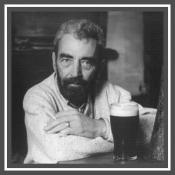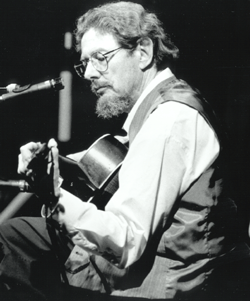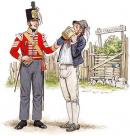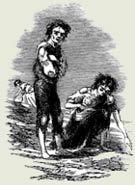Author Planxty
The Bonny Light Horseman / Broken-Hearted I Wander
Anonymous
Well now Bonaparte, he has commanded his troops for to stand
(Continues)
(Continues)
2014/1/25 - 18:39
Song Itineraries:
Napoleon's Wars, Traditional English, Scottish and Irish ballads
Only Our Rivers Run Free

[1965]
Interpretata anche da Christy Moore con i Planxty
Forse la più celebre canzone di Mickey MacConnell, scritta la tempo del Civil Rights movement in Ulster, quando la comunità cattolica - prima dell'escalation dello scontro violento tra IRA da una parte, esercito inglese, polizia e gruppi paramilitari protestanti dall'altra - promosse importanti iniziative non violente, come la campagna per la giustizia sociale (CSJ, Belfast 1964) e la campagna di disobbedienza civile. Fu il Bloody Sunday del 1972 a mettere di fatto in crisi l'approccio non violento alla soluzione del conflitto e a sprofondare l'Irlanda del Nord in un quarto di secolo di efferata violenza.
Interpretata anche da Christy Moore con i Planxty
Forse la più celebre canzone di Mickey MacConnell, scritta la tempo del Civil Rights movement in Ulster, quando la comunità cattolica - prima dell'escalation dello scontro violento tra IRA da una parte, esercito inglese, polizia e gruppi paramilitari protestanti dall'altra - promosse importanti iniziative non violente, come la campagna per la giustizia sociale (CSJ, Belfast 1964) e la campagna di disobbedienza civile. Fu il Bloody Sunday del 1972 a mettere di fatto in crisi l'approccio non violento alla soluzione del conflitto e a sprofondare l'Irlanda del Nord in un quarto di secolo di efferata violenza.
When apples still grow in November,
(Continues)
(Continues)
Contributed by Alessandro 2009/9/22 - 13:01
Song Itineraries:
Conflicts in Ireland
Billy Gray, or True Love Knows No Season

[1974]
Lyrics and music by Norman Blake and Nancy Blake
Album: The Fields of November
Also recorded by Planxty in the album "The Woman I Loved So Well" (1980)
Feat. Christy Moore
Testo e musica di Norman Blake e Nancy Blake
Album: The Fields of November
Incisa anche dai Planxty nell'album "The Woman I Loved So Well" (1980)
Feat. Christy Moore
Questa canzone è, lo confesso, uno dei miei "demoni". Una cowboy song che ho sentito per la prima volta, su una cassetta registrata di fortuna ad una radio, molti anni fa interpretata da uno dei più famosi gruppi irlandesi; già questo la renderebbe speciale. Ma non devo essere stato certo il primo, se già Christy Moore dichiarò quanto segue:
"In December 1979 I met Noel Shine (whistle) in the Phoenix Pub, Cork, where he sang this song for me. It was written by Norman Blake and it's special in that it's the first cowboy song I've heard in a... (Continues)
Lyrics and music by Norman Blake and Nancy Blake
Album: The Fields of November
Also recorded by Planxty in the album "The Woman I Loved So Well" (1980)
Feat. Christy Moore
Testo e musica di Norman Blake e Nancy Blake
Album: The Fields of November
Incisa anche dai Planxty nell'album "The Woman I Loved So Well" (1980)
Feat. Christy Moore
Questa canzone è, lo confesso, uno dei miei "demoni". Una cowboy song che ho sentito per la prima volta, su una cassetta registrata di fortuna ad una radio, molti anni fa interpretata da uno dei più famosi gruppi irlandesi; già questo la renderebbe speciale. Ma non devo essere stato certo il primo, se già Christy Moore dichiarò quanto segue:
"In December 1979 I met Noel Shine (whistle) in the Phoenix Pub, Cork, where he sang this song for me. It was written by Norman Blake and it's special in that it's the first cowboy song I've heard in a... (Continues)
Billy Gray rode into Gantry way back in '83
(Continues)
(Continues)
Contributed by Riccardo Venturi 2007/3/24 - 23:09
Song Itineraries:
Anti War Love Songs, Murder Ballads
Arthur McBride
Anonymous

Andy Irvine's Version as performed by Planxty
da/from The Mudcat Café
This song was sung by Paul Brady and recorded by him and Andy Irvine on a terrific LP called "Paul Brady & Andy Irvine." It was originally on the Mulligan label and, later, on Green Linnet, I believe. Paul used to live here in New York. Anytime he used to sing "Arthur McBride" at a session, people would come running up and downstairs and from all over to hear it. There was never any question that it was a great song and that he did it masterfully. It is an Irish anti-recruiting song, of course, and, I could be wrong about this, but I believe the actual source was a book of New England (possibly Maine or Vermont) folk songs. It just turned up there.
I looked at the DigiTrad database under "Arthur McBride" and found 3 versions. The second one, ARTHUR McBRIDE & THE SARGEANT, is very close to what you want. I have... (Continues)
da/from The Mudcat Café
This song was sung by Paul Brady and recorded by him and Andy Irvine on a terrific LP called "Paul Brady & Andy Irvine." It was originally on the Mulligan label and, later, on Green Linnet, I believe. Paul used to live here in New York. Anytime he used to sing "Arthur McBride" at a session, people would come running up and downstairs and from all over to hear it. There was never any question that it was a great song and that he did it masterfully. It is an Irish anti-recruiting song, of course, and, I could be wrong about this, but I believe the actual source was a book of New England (possibly Maine or Vermont) folk songs. It just turned up there.
I looked at the DigiTrad database under "Arthur McBride" and found 3 versions. The second one, ARTHUR McBRIDE & THE SARGEANT, is very close to what you want. I have... (Continues)
ARTHUR McBRIDE AND THE SEARGEANT
(Continues)
(Continues)
Contributed by Riccardo Venturi 2005/11/13 - 01:31
×
![]()


Martin Howley cantò una versione chiamata "The Young Horseman" a Pat Mackenzie nella sua casa di Fanore, nella contea di Clare, nell'estate del 1975. Questa registrazione è stata inclusa nel 1998 nella fondamentale antologia A Story I'm Just About to Tell (The Voice of the People Series Volume 8).
Il gruppo folk di Manchester Canny Fettle ha inciso una versione intitolata Bonny Light Horseman nel 1975 nell'album Varry Canny.
Lal e Norma Waterson hanno cantato la canzone nell'album del 1977 A True Hearted Girl.
Sam Henry sostiene che la melodia, che ha probabilmente più di quattrocento anni, sia di origine irlandese perché utilizza una "gapped scale" (cioè una scala che non usa la quarta e la settima nota). Secondo William Barret la canzone era molto diffusa in Inghilterra dopo il 1790 diffusa su fogli volanti... (Continues)